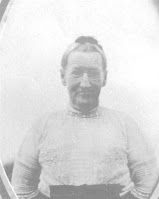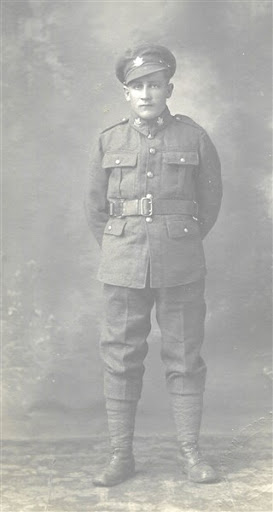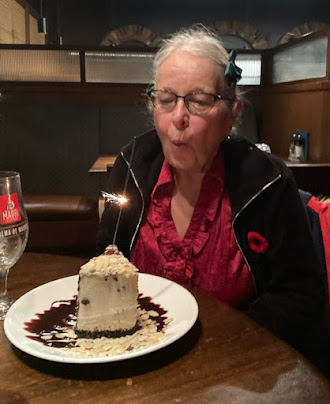#78 REMEMBERING GUNNER CHARLES & PRIVATE LINCOLN WERTH
MY TWO GREAT UNCLES
Charles and
Lincoln Werth were the middle sons in a family of seven. Charlie was born July 28, 1894 and Lincoln on May 8, 1897. (My grandmother, Jean, was their older
sister and Aunt Lila their younger sister. Bert and Irvin were older and younger brothers. Another sister. Anne, died in infancy).
Their parents were Edward Werth and Ann Harper. The boys grew up on their
grandparents’ farm before the family moved into Elora after 1901.
By 1911,
Charlie, age 16, was working alongside his father in an Elora chair factory,
perhaps Mundell’s. There were two
factories in Elora, but it was the Mundell Company that dominated the village’s
economy. (The town’s population was about 1200 and 210 worked at Mundell’s.)
Workers were expected to work 55 hours/week, 10 hours Monday to Friday and 5
hours on Saturday. The company
manufactured bureaus, dining-room suits, mattresses and upholstered furniture,
stuffed with horsehair. A major order, which added to the firm’s prestige as a
furniture-maker, was for all the bedroom and dining furniture for Toronto’s
opulent King Edward Hotel. Perhaps the most known product was Mundell’s Kiddie
Kar, a small wooden children’s toy. World War I also brought orders for wooden
shell boxes and army furniture.
Conscription in Canada during World War I was introduced as
a response to the heavy toll and intense manpower demands of the conflict. When
Canada entered the war in 1914 as part of the British Empire, there was
initially strong volunteer support. However, as the war dragged on, casualties
mounted, and volunteer enlistment declined sharply. By 1917, it became apparent
that the military needs could not be met through volunteers alone, prompting
the government to take action.
In 1917, Prime Minister Robert Borden introduced the Military Services Act, which mandated conscription for men between the ages of 20 and 45. This decision, however, proved highly divisive, sparked protests, riots, and political backlash, ultimately splitting the country along linguistic and cultural lines. Borden's Union Government, a coalition of pro-conscription forces, won the December 1917 election, in part due to voting restrictions placed on anti-conscription populations.
Though the Military Services Act eventually resulted in the
conscription of around 100,000 men, only about 24,000 conscripts made it
overseas before the war ended in 1918. Charlie and Lincoln were two men who
were conscripted and who did land up on the Western Front.
I wonder how their mother, Ann, felt when two of her sons were called up; it must have been a mix of overwhelming emotions—fear, pride, helplessness, and even resentment. Fear would be one of her foremost feelings-- that her sons were being sent to a brutal, unfamiliar battlefield with little assurance of their safety. It would cast a constant shadow over her daily life. The news from the frontlines, filled with reports of death and injury, would make her dread the sight of a telegram, fearing it might contain the worst possible news. She might also have felt a degree of pride, tempered by worry, knowing her sons were sacrificing for a cause that others deemed noble and necessary. The sense that they were
Mother --Ann Werth--what emotions?fighting for their country, for their family's safety, or to uphold Canada’s role in the Allied effort might have brought a small comfort. Yet, this pride would often be secondary to a deep-seated worry and sadness. Helplessness would dominate her emotions as well. Unlike with voluntary enlistment, conscription left her with little say in the matter. Her sons’ fates were being decided by a distant government, with little regard for the personal cost. This might lead to anger or resentment toward the authorities, especially if she felt that they were being unfairly taken from her or forced into something they did not wish to do. And lastly, Ann might have felt a deep, lingering sorrow, knowing the innocence and safety of her family had been shattered. The war had reached her doorstep, stolen her peace and plunging her family into a harsh new reality that might never be repaired, even if her sons did return home. In sum, Ann endured a daily, torturous mix of love, pride, anger, and fear, feeling both the absence and the weight of her sons' looming departure as a heavy, constant ache.
And I wonder how, beyond the fears of battle, Charlie and Lincoln felt and were treated. Volunteer soldiers, who had willingly signed up to fight, frequently saw themselves as more committed or patriotic than the conscripts and tended to view them with a degree of skepticism, frustration or even disdain; this led to a divide between volunteers and conscripts, contributing to a tense dynamic among the ranks. Many volunteers felt pride in their choice to enlist and make personal sacrifices for what they believed was a just cause; in contrast, conscripts were sometimes regarded as reluctant participants or "slackers," a term volunteers used disparagingly for those who had avoided enlisting voluntarily. Some of this resentment stemmed from the volunteers’ belief that conscription diluted the camaraderie and unity that had developed among those who had chosen to fight. Additionally, the initial conscripts were sometimes perceived as less well-prepared or motivated, as they hadn’t undergone the same rigorous training or mental preparation that volunteers had experienced. Over time, though, the needs of battle often helped break down these divisions. In the face of shared hardships and the brutality of trench warfare, many conscripts and volunteers forged bonds out of mutual dependence and survival. By the end of the war, some volunteers acknowledged that the conscripts had proven their bravery and resilience on the battlefield, helping to close the gap in perceptions.
Charlie, aged 22, was drafted on October 31, 1917, and was
shipped out off to Europe aboard the SS Lapland on February 11, 1918. He served
in France as a driver with the 68th Battery; these were the soldiers
who drove the teams of horses that pulled the guns. There isn’t too much in
Charlie’s files but it looks like he was initially stationed at Witley , a
temporary training camp near London, and
that he was sent overseas to France in October 1918 , a month before
armistice. He returned to Canada in April 1919 and was discharged from the army
the next month. Charlie earned $33 basic pay plus $17 as a driver a month.
Lincoln, age, 20, was drafted on January 5, 1918, and left for England, aboard the Gampion the next month. He was sent to the Western Front in France in June where he joined the 44th Battalion and was involved in the 100 Days Offensive. During the Hundred Days Offensive (August 8 to November 11, 1918), the Canadian Corps suffered over 45,000 casualties with an estimated 6,800 Canadian soldiers killed. This period saw some of the fiercest and most relentless fighting for the Canadians, who were crucial in breaking through heavily fortified German positions along the Western Front. Canadian victories were pivotal in pushing German forces back and leading to the Armistice on November 11, 1918.
Private Lincoln Werth
On September 6, Lincoln was wounded by a shrapnel wound to
his left arm. He was hospitalized for a month and although the flesh wound
healed, the shrapnel remained. Lincoln returned to Canada, aboard the Olympic
on Jan 17, 1919, and was discharged mid-February. He was being paid $20 per
month.
Ann and Edward must have rejoiced when their two sons returned to Elora. Charlie and Lincoln’s lives did parallel each other. Both men were only 5 feet, 3 inches and each weighed about 115 pounds. Immediately after the war both sons lived with their parents in Elora and worked as moulder and labourer. Then both brothers moved to Oxford County to work in the Beachville Lime quarries. What jobs—blaster, hauler, working the crushers, etc.—is not known although both became crew foremen. Limestone appears as crushed stone along our roads; it is mixed with asphalt to produce shingles or with water and sand to make plaster; it is essential to the production of glass, paper and steel; it is used to reduce contaminants in sugar care; it is even used in toothpaste as an abrasive to clean and whiten teeth; it acts as a chemical fertilizer for farming purposes.
Beachville Lime Quarry... Lincoln is fourth from left
Lincoln may be fourth from left
Charlie, aged 35, married Germaine Mailhot, aged 35 in January
1930. They had no children. They lived in Beachville. Charlie died on March 25,
1958, aged 63 and Germain passed 1965. Lincoln, age 34, married Florence
Bidwell, age 26, in February 1932. They also had no children. They lived in
Ingersoll and later Port Burwell on Lake Erie where Lincoln briefly operated a
grocery and service station. Florence died of cancer in Sept 2, 1950 of cancer.
Lincoln died in 1966, aged 70. Both brothers and their spouses are buried beside
each other in the Harris Street Cemetery, Ingersoll.
Harris Street Cemetery, Ingersoll
CHARLES RUSSELL WERTH b. Jul 28, 1894 in Pilkington Township, Wellington Co. m. Marie Germaine Blanche Cecile Mailhot (1894-1965) on Feb 3, 1930 in Galt, Waterloo Co, Ont d. Mar 25, 1958 in Beachville, Ont
LINCOLN ROY WERTH b. May 8, 1897 in Pilkington Township, Wellington Co. m. Florence Grace Bidwell (1906-1950) on Feb 20, 1932 in Hespeler, Waterloo Co, Ont d. May 23 1966 in London, Ont my great uncles (Homuth-Werth line)
Drive through small towns of South Western Ontario in November and it is so humbling to see banners of that town's veterans proudly flying from the lamp posts. My hometown Harriston was one of the first to adopt this programme and now banners stretch the length of both main streets. Similarly Elora now flies banners for their sons and daughters who served. I intent to donate banners there in honour of my two great uncles, Charlie and Lincoln.


























Comments
Post a Comment